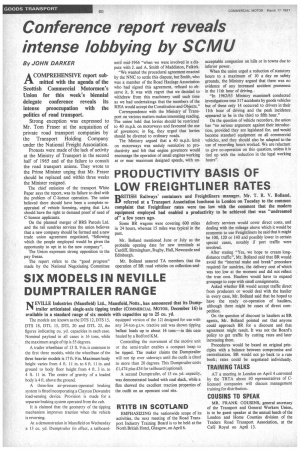PRODUCTIVITY BASIS OF LOW FREIGHTLINER RATES
Page 62

If you've noticed an error in this article please click here to report it so we can fix it.
BRMSH Railways' containers and Freightliners manager, Mr. T. R. V. Rolland, referred at a Transport Association luncheon in London on Tuesday to the common complaint that Freightliner rates were too low with the comment that the modern equipment employed had enabled a productivity to be achieved that was "undreamed of" a few years ago.
Some BR wagons were covering 600 miles in 24 hours, whereas 15 miles was typical in the past.
Mr. Bolland mentioned June or July as the probable opening date for new terminals at Cardiff, Birmingham, Rugby, Hull, Newcastle and Edinburgh.
Mr. Selland assured TA members that the operation of BR road vehicles on collection-and
delivery services would cover direct costs, and dealing with the mileage above which it would be economic to use Freightliners he said that it might be 100, 120 or 140 and possibly lower in certain special cases, notably if port traffic were involved.
After stating "Yes, we hope to cream longdistance traffic", Mr. Selland said that BR would avoid the "internal make and break" procedure required for sundries, the delivery cost of which was too low at the moment and did not reflect the true cost. Hauliers would have to expand groupage to cope with small consignments.
Asked whether BR would accept traffic direct from producers or would deal with the haulier in every case, Mr. Bolland said that he hoped to have the ready co-operation of hauliers. although there might be cases of direct competition.
On the question of discount to hauliers as BR agents, Mr. Bolland pointed out that anyone could approach BR for a discount and that agreement might result. It was not the Board's policy to get traffic by cutting rates and later increasing them.
Procedures would be based on original principles with a balance between compromise and centralization. BR would not go back to a rate book; rates could be negotiated individually.
TRAINING TALKS
AT a meeting in London on April 4 convened by the TRTA about 40 representatives of Clicensed companies will discuss management training for distribution.
COUSINS TO SPEAK MR. FRANK COUSINS, general secretary of the Transport and General Workers Union, is to be guest speaker at the annual lunch of the London and Home Counties division of the Traders Road Transport Association, at the Cafe Royal on April 13.








































































































































































































